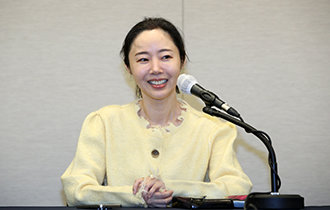PM Han Is Opposition Party Dilemma
The Grand National Party (GNP) is facing a dilemma regarding its demand that the new prime ministerial nominee, Han Myeong-sook, disaffiliate herself from the ruling Uri Party.
The GNP needs to push its demands for a prime minister with electoral neutrality, but given the expectations of womens circles over the first female prime minister, it may be difficult for the party to maintain its unconditional objection.
In a comment on March 26, GNP spokesperson Lee Gye-jin repeatedly called for Hans disaffiliation from her party, saying, Most previous prime ministers and ministers of justice have not belonged to a particular party; they have been politically neutral.
He went on to demand that Justice Minister Cheon Jung-bae be dismissed in an effort to maximize the partys electoral neutrality requests.
In fact, only a few of the 12 nationwide elections since 1990 have been held with a prime minister registered to a political party.
The only two exceptions were former acting Prime Minister Kim Jong-pil and former Prime Minister Park Tae-jun, both of whom kept their affiliations to the United Liberal Democrats (ULD) during the local election in 1998 and the 16th general election in 2000, respectively. However, their moves were based on the presidential election pledge of the DJP Coalition (led by Kim Dae-jung and Kim Jong-pil): The presidency would go to the Democratic Party, who ran a presidential candidate; the prime ministerial post would be taken by a member of its coalition partner, the ULD. Prime Minister Parks successor, Lee Han-dong, was also a former chairman of the ULD, but he resigned his membership of the party before the local election in 2002.
Chairman Lee Bang-ho of the GNPs Policy Committee said on March 26, The prime ministerial nominees breaking with her party is a minimum courtesy for the opposition parties. If she refuses to do so, we would not cooperate regarding her appointment, again suggesting that the party might choose to reject a confirmation hearing vote on Han.
The GNP believes that as part of its strategies for the May 31 local election, it should not let the issue just disappear. By nominating Han as prime minister and presenting former Justice Minister Kang Geum-sil as a candidate for the Seoul mayors post, the Uri Party is obviously aiming to create a female craze in the local election. Against this backdrop, the GNP is seeking to take political countermeasures against such moves by the governing party.
There are concerns that the ruling partys aggressive nomination of female candidates is a strategy intended to highlight the sexual harassment scandal of the GNPs former secretary-general, Choi Yeon-hee.
Under the command of Chairwoman Park Geun-hye, we sought to win the hearts of female voters in the upcoming local election by putting into practice our pledge to fill more than 30 percent of our candidacies with female candidates. But we are facing trouble due to the ruling partys choice of a female nominee, Han, confessed a key GNP official.
Meanwhile, it was pointed out by some GNP members themselves that when it came to the issue of Hans party affiliation, voting against her in a confirmation hearing is likely to backfire.
One GNP official expressed his concern, saying, With regard to our demand that Han withdraw from her party, the ruling party might hit us back, claiming the GNP is opposed to appointing a female prime minister for the first time. In this case, we might lose our female constituency.
The GNP initially said, Han Myeong-sook would make a fairly good prime minister, comparing her to Kim Byeong-jun, the presidents chief policy advisor who was one of the candidates for the prime ministerial post considered by the Uri Party leadership. However, the party later raised the issue of Hans party affiliation. In this regard, some indicated that due to such mistakes in dealing with the issue, the GNP dealt a blow to the persuasiveness of its own claim that Han should leave her party.
The Uri Party is resisting the GNPs move every day by stating, The GNPs demand on Hans disaffiliation is unreasonable under a responsible party politics system. The Democratic Labor Party also attacked the GNP in its March 24 comment titled, The GNP: Too Petty. All these situations are adding up to the trouble that the GNP is faced with.
Sung-Won Park Jung-Eun Lee swpark@donga.com lightee@donga.com







